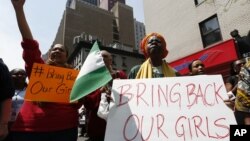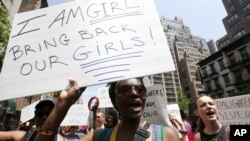BROOKLYN, NEW YORK —
The world has been outraged and saddened by the kidnapping in northern Nigeria of 276 schoolgirls by the extremist group Boko Haram, which has threatened to sell them into slavery. For Nigerian-Americans who have watched these events from afar, the anguish and anger have been acute.
At the Amarachi Lounge, where New York Nigerians like to gather after work, Samuel Adewumi, a youth educator, watched a news report showing a Boko Haram video of the kidnapped schoolgirls.
A father himself, Adewumi feels for the girls and their parents.
“It really hits home to feel like someone would actually come in, take your child for no reason and have them somewhere you can’t locate them; you have no idea how they’re being treated and if they are being fed, if they are even alive,” he said. “That’s enough to drive somebody insane.”
New York more up to date than homeland
Nigerians in New York, thousands of kilometers away from their West African homeland, may be more up to date on the crisis than their relatives back home.
When Daniel Onyeike spoke with his mother earlier in the day, she had not seen the video and was ready to believe reports that it might be fake.
“First of all, there is no light. So how can you hear the news? You can’t watch TV. So it’s not like here where everyone has Internet. So how are you going to know what’s going on?’” he asked. “You’re only listening to rumors or [reading] the little local paper you can afford, which is maybe printed in someone’s backyard. And whatever story or whatever propaganda he spreads, that is what you are going to take.”
The “he” Onyeike is referred to is Nigerian President Goodluck Jonathan, whose government has been unable, or some say unwilling, to locate or rescue the girls.
“And the fact that it took Nigeria some 20-something days to even react to this situation is really disgusting,” he said with a grimace.
Fear and chaos impact businesses
Meanwhile, business has suffered on both sides of the Atlantic. Until recently, Onyeike sold used vehicles in northern Nigeria from his office in Brooklyn, but the rise of Boko Haram has ended that, at least for now.
“Business is not moving. Life is not moving on as usual. Everyone is scared. So it’s not good for me. It’s not good for Nigeria. It’s not good for anybody. Everybody wants these girls back. Everybody wants Boko Haram to be destroyed,” Onyeike said.
Well, not everyone, asserted Samuel’s brother, Joseph Adewumi, who owns a bar. He said that supplying terrorists like Boko Haram costs a lot money, and that there is money to be made from terror as well.
Money fuels terror
The Boko Haram kidnappings have inspired some, like Samuel Adewumi and his 19-year-old daughter, a college student, to bring their loved ones closer.
"We haven’t talked about it directly. More I guess affirming each other in our lives more so than we have before. She sent me the text today, ‘Daddy, I miss you,’ out of the blue,” he said.
At the Amarachi Lounge, where New York Nigerians like to gather after work, Samuel Adewumi, a youth educator, watched a news report showing a Boko Haram video of the kidnapped schoolgirls.
A father himself, Adewumi feels for the girls and their parents.
“It really hits home to feel like someone would actually come in, take your child for no reason and have them somewhere you can’t locate them; you have no idea how they’re being treated and if they are being fed, if they are even alive,” he said. “That’s enough to drive somebody insane.”
New York more up to date than homeland
Nigerians in New York, thousands of kilometers away from their West African homeland, may be more up to date on the crisis than their relatives back home.
When Daniel Onyeike spoke with his mother earlier in the day, she had not seen the video and was ready to believe reports that it might be fake.
“First of all, there is no light. So how can you hear the news? You can’t watch TV. So it’s not like here where everyone has Internet. So how are you going to know what’s going on?’” he asked. “You’re only listening to rumors or [reading] the little local paper you can afford, which is maybe printed in someone’s backyard. And whatever story or whatever propaganda he spreads, that is what you are going to take.”
The “he” Onyeike is referred to is Nigerian President Goodluck Jonathan, whose government has been unable, or some say unwilling, to locate or rescue the girls.
“And the fact that it took Nigeria some 20-something days to even react to this situation is really disgusting,” he said with a grimace.
Fear and chaos impact businesses
Meanwhile, business has suffered on both sides of the Atlantic. Until recently, Onyeike sold used vehicles in northern Nigeria from his office in Brooklyn, but the rise of Boko Haram has ended that, at least for now.
“Business is not moving. Life is not moving on as usual. Everyone is scared. So it’s not good for me. It’s not good for Nigeria. It’s not good for anybody. Everybody wants these girls back. Everybody wants Boko Haram to be destroyed,” Onyeike said.
Well, not everyone, asserted Samuel’s brother, Joseph Adewumi, who owns a bar. He said that supplying terrorists like Boko Haram costs a lot money, and that there is money to be made from terror as well.
Money fuels terror
The Boko Haram kidnappings have inspired some, like Samuel Adewumi and his 19-year-old daughter, a college student, to bring their loved ones closer.
"We haven’t talked about it directly. More I guess affirming each other in our lives more so than we have before. She sent me the text today, ‘Daddy, I miss you,’ out of the blue,” he said.





